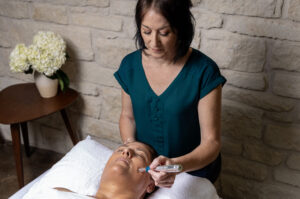 Holistic microneedling, also known as collagen induction therapy, is a minimally invasive procedure that involves a small pen with 12 tiny, sterile needles passed over the skin to create micro-injuries in the skin’s surface to treat fine lines, wrinkles, acne scars. With minimal downtime and a series of sessions only needing to be performed once per month, this is the perfect natural, non-toxic treatment for busy people.
Holistic microneedling, also known as collagen induction therapy, is a minimally invasive procedure that involves a small pen with 12 tiny, sterile needles passed over the skin to create micro-injuries in the skin’s surface to treat fine lines, wrinkles, acne scars. With minimal downtime and a series of sessions only needing to be performed once per month, this is the perfect natural, non-toxic treatment for busy people.
Microneedling helps to promote collagen growth to improve skin texture and enhances the absorption of skincare products up to 2000%, which is why clean products are crucial with this procedure. It can also promote hair growth on the scalp and reduce acne scars on the face.
A holistic microneedling treatment includes body acupuncture to address the root cause of your concerns and provide an extra level of relaxation.
Recommended Frequency:
Depending on your goals, microneedling works best in 3-6 sessions for lasting results. Each follow up session is scheduled 4-6 weeks apart. For maintenance, schedule tune up visits every 6 months or other issues can be addressed with another series of treatments.
Aftercare:
- Redness occurs for 8-12 hours after a treatment – 100% pure aloe vera can help reduce the redness.
- No exercise the day of the treatment as sweating can irritate the face.
- No make up the day of the treatment
- Avoid sun – use mineral sunscreen for a week post-microneedling
- Wash face with only warm water (no products)
- Go back to regular facial routine the day after the treatment.
- Avoid retinol, vitamin C serums, glycolic acid or alpha hydroxy acids (AHAs) for at least a week after treatment.
We do not recommend microneedling if you currently:
- Have had a facelift, filler, or botox injections within the past 6 months
- Have used retinol, vitamin C serums, glycolic acid or alpha hydroxy acids (AHAs) within the past week.
- Take blood thinners
- Receive chemotherapy or radiation
- Have moderate to severe skin conditions (psoriasis, rosacea, eczema, active infection, warts, active herpes outbreak)
- Have keloids
- Are pregnant
